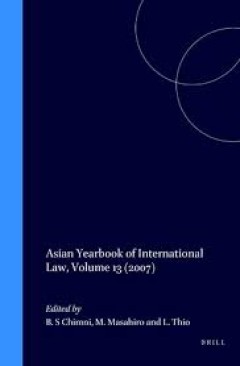Filter by

Asian Yearbook of International Law, Volume 2 (1992)
The Asian Yearbook of International Law is the first publication dedicated primarily to international law as seen from an Asian perspective. It provides a forum for the publication of articles in the field of international law written by experts from the region, and also other articles relating to Asian topics. Its aim is twofold: to promote the dissemination of knowledge of international law i…
- Edition
- Volume: 2
- ISBN/ISSN
- 978-90-04-40061-0
- Collation
- -
- Series Title
- -
- Call Number
- -

Asian Yearbook of International Law, Volume 19 (2013)
- Edition
- Volume: 19
- ISBN/ISSN
- 78-90-04-37975-6
- Collation
- -
- Series Title
- -
- Call Number
- -
- Edition
- Volume: 19
- ISBN/ISSN
- 78-90-04-37975-6
- Collation
- -
- Series Title
- -
- Call Number
- -

Asian Yearbook of International Law, Volume 18 (2012)
- Edition
- Volume: 18
- ISBN/ISSN
- 978-90-04-37973-2
- Collation
- -
- Series Title
- -
- Call Number
- -
- Edition
- Volume: 18
- ISBN/ISSN
- 978-90-04-37973-2
- Collation
- -
- Series Title
- -
- Call Number
- -

Asian Yearbook of International Law, Volume 17 (2011)
- Edition
- Volume: 17
- ISBN/ISSN
- 978-90-04-37971-8
- Collation
- -
- Series Title
- -
- Call Number
- -
- Edition
- Volume: 17
- ISBN/ISSN
- 978-90-04-37971-8
- Collation
- -
- Series Title
- -
- Call Number
- -

Asian Yearbook of International Law, Volume 16 (2010)
- Edition
- Volume: 16
- ISBN/ISSN
- 978-90-04-37969-5
- Collation
- -
- Series Title
- -
- Call Number
- -
- Edition
- Volume: 16
- ISBN/ISSN
- 978-90-04-37969-5
- Collation
- -
- Series Title
- -
- Call Number
- -

Asian Yearbook of International Law, Volume 15 (2009)
- Edition
- Volume: 15
- ISBN/ISSN
- 978-90-04-43382-3
- Collation
- -
- Series Title
- -
- Call Number
- -
- Edition
- Volume: 15
- ISBN/ISSN
- 978-90-04-43382-3
- Collation
- -
- Series Title
- -
- Call Number
- -

Asian Yearbook of International Law, Volume 14 (2008)
- Edition
- Volume: 14
- ISBN/ISSN
- 978-90-04-43380-9
- Collation
- -
- Series Title
- -
- Call Number
- -
- Edition
- Volume: 14
- ISBN/ISSN
- 978-90-04-43380-9
- Collation
- -
- Series Title
- -
- Call Number
- -

Asian Yearbook of International Law, Volume 13 (2007)
- Edition
- Volume: 13
- ISBN/ISSN
- 978-90-04-43378-6
- Collation
- -
- Series Title
- -
- Call Number
- -
- Edition
- Volume: 13
- ISBN/ISSN
- 978-90-04-43378-6
- Collation
- -
- Series Title
- -
- Call Number
- -

Japan’s Arduous Rejuvenation as a Global Power = Democratic Resilience and …
This open access book assesses the profound impact of Japan’s aspirations to become a great power on Japanese security, democracy and foreign relations. Rather than viewing the process of normalization and rejuvenation as two decades of remilitarization in face of rapidly changing strategic environment and domestic political circumstances, this volume contextualizes Japan’s contemporary in…
- Edition
- 1
- ISBN/ISSN
- 9789811361906
- Collation
- XIII, 242 ill; lamp
- Series Title
- -
- Call Number
- -

Gender, Ritual and Social Formation in West Papua : A Configurational Analysi…
This study, based on a lifelong involvement with New Guinea, compares the culture of the Kamoro (18,000 people) with that of their eastern neighbours, the Asmat (40,000), both living on the south coast of West Papua, Indonesia. The comparison, showing substantial differences as well as striking similarities, contributes to a deeper understanding of both cultures. Part I looks at Kamoro society…
- Edition
- -
- ISBN/ISSN
- 978-90-04-25372-8
- Collation
- xii, 300
- Series Title
- Verhandelingen van het Koninklijk Instituut voor Taal-, Land- en Volkenkunde, Volume: 258
- Call Number
- -
 Computer Science, Information & General Works
Computer Science, Information & General Works  Philosophy & Psychology
Philosophy & Psychology  Religion
Religion  Social Sciences
Social Sciences  Language
Language  Pure Science
Pure Science  Applied Sciences
Applied Sciences  Art & Recreation
Art & Recreation  Literature
Literature  History & Geography
History & Geography